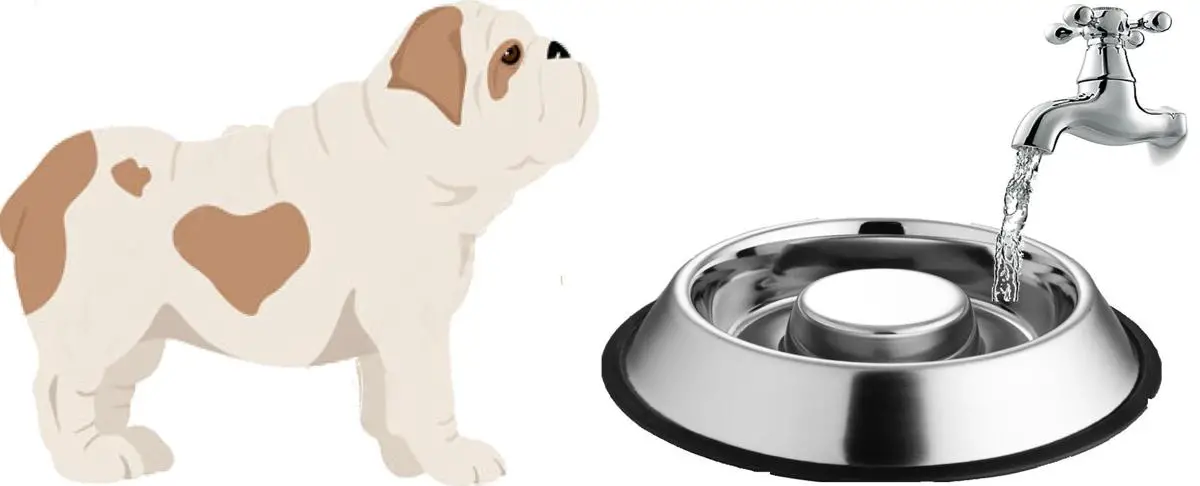Quick Links: Table of Contents
- Bulldog Breed Overview
- History of the Bulldog Breed. Where Bulldogs came from
- What the Bulldog Looks Like
- How Much is the Bulldog Puppy?
- Best Bulldog Breeders
- Adopting or Rescuing the Bulldog
- Bulldog Growth
- What Colors do Bulldogs Have?
- The Temperament of the Bulldog
- How Long Bulldogs Live
- Bulldog Litter Size
- How Fast Bulldogs Can Run
- Good Names for Bulldogs
- How Intelligent are Bulldogs?
- How Popular are Bulldogs with New Dog Owners?
- Health Problems in Bulldogs and How to Prevent Them
- How to Take Care of Bulldog
- Dog Breeds That Are Similar to Bulldogs
- Other Things to Know About Bulldogs
Bulldog Breed Overview
The Bulldog is a small-sized dog.
The adult Bulldog stands 12 to 15 inches tall at the shoulder.
The Bulldog belongs to the Companion Dogs group.
Dogs in the Companion Dogs group, like the Bulldog, were bred to be companions for humans. Their main goal in life is to be with people, and they will be very sad if left to themselves for long hours day after day.
The fact that the Bulldog belongs to the Companion Dogs group is one of the reasons why Bulldogs have the personality and temperament that they have.
The temperament of the Bulldog is generally described as:
- Dependable
- Dignified
- Loving
- Predictable
- Social
- Sweet
History of the Bulldog Breed. Where Bulldogs came from
The Bulldog is descended from ancient Mastiffs that originated in Asian areas, and wandering nomads brought the breed to Europe with them.
During breeding, the Mastiff was refined into the dog we know today as the Bulldog.
It was ideal for the blood sport known as bull baiting due to its short muzzle and wide lower jaw.
To avoid being thrown by the bull, the dog would stay low to the ground and clamp its teeth onto the bull`s nose.
The Bulldog got its name from the upturned shape of the dog`s nose, which allowed it to breathe while clinging to the bull.
The breed has a high pain tolerance, but many were injured or killed while competing.
.
What the Bulldog Looks Like
The Bulldog is a medium-sized animal with short legs and a solid compact appearance.
This breed walks in a loose-jointed, shuffling sideways roll.
When mature, they can be a sturdy dog that is no longer easy to lift! The body and head are enormous, with extra skin on the skull and those well-known skin folds and wrinkles on the face.
The muzzle is wide, short, and pug shaped, with a broad, deep stop.
Although their black noses are broad with large nostrils, they have breathing or respiratory problems due to the shortness of their muzzle.
Their eyes are dark in color and set deep in their heads, and they have small, thin ears.
.
How Much is the Bulldog Puppy?

The average price of a Bulldog puppy is $4220. The price of a Bulldog puppy ranges from $3000 to $4500.
A lot of factors determine the price of the Bulldog. These factors include what health records the Bulldog puppy has, the lineage of the Bulldog puppy, the US state the breeder is located in, etc.
To estimate how much you can expect to pay for a puppy Bulldog based on the many factors that determine the price of the Bulldog puppy, check out our calculator that lets you estimate how much you should expect to pay for the Bulldog puppy based on what you want in the puppy.
When looking to buy a puppy, look at buying a puppy only from well-established breeders that breed puppies primarily for the love of the Bulldog breed, and secondarily for profit. Do not buy a puppy from a puppy mill. Puppy mills mass-produce puppies in bad living conditions for maximum profit.
You may also consider adopting instead of buying a puppy. Adoption costs are very low compared to the price of a puppy.
Best Bulldog Breeders
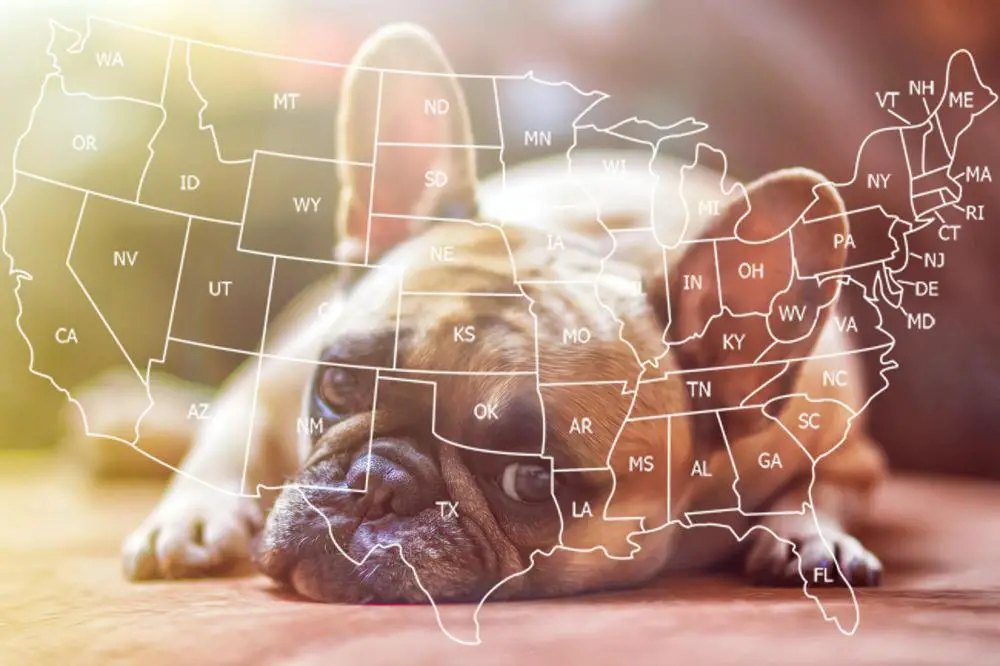
We have researched reputable Bulldog breeders that you can buy a puppy.
Go to this page for our complete list of reputable Bulldog breeders in various states in the United States.
On this page, you will see how much these breeders sell their puppies for, and how many puppies they have available.
A few of these breeders are listed below.
Fallen Timbers Bulldogs
Puppy Price: $2500-$3000
Green Akers Bulldogs
Puppy Price: $2300
Marbullous Bullyz
Puppy Price: Check with breeder
Catherine Moorehouse
Puppy Price: $2500.00
American Trail Dogs LLC
Puppy Price: Check with breeder
Adopting or Rescuing the Bulldog
You may consider adopting a dog instead of buying a puppy. Many dogs, Bulldogs included, are currently available for adoption in your local dog shelters.
These helpless but adorable dogs are waiting in dog shelters hoping that someday someone will rescue them. Dog adoption costs are lesser than the cost of a new puppy. Dog adoption costs are usually around $300 or even less.
In addition to your local dog shelter, another good place to find dogs that are available for adoption is petfinder.com.
Below is an adorable Male Bulldog named George that is currently available for adoption on Petfinder.com. You can find other lovely Bulldogs like George on pefinder.com.

Messi is the name of another Bulldog (Male) on petfinder.com that is looking for a new forever home.
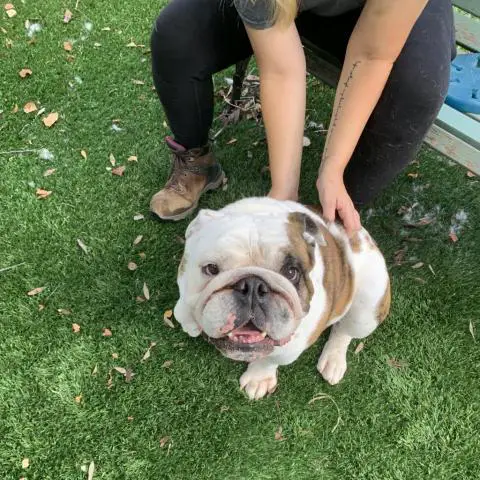
You can find more Bulldogs that are available for adoption on petfinder.
Bulldog Growth

New Bulldog owners need to know about the growth of their Bulldogs. This will help them plan their living spaces accordingly.
Also, knowing the typical growth pattern of the Bulldog will help new owners catch the abnormal growth of their Bulldog early.
See our calculator for predicting how big your Bulldog puppy will get. You will also learn about the typical weight of the Bulldog at different ages and how to catch abnormal growth in your Bulldog

What Colors do Bulldogs Have?
Bulldogs come in the following beautiful primary colors:
- Brindle
- White / Cream
- Brown / Chocolate
- Yellow / Tan / Blond / Fawn
- Tricolor (Brown, Black, & White)
- Merle (Red)
- Gray / Blue / Silver
- Black
- Red / Chestnut / Orange
- Bicolor
- Apricot / Beige
- Merle (Blue)

The Temperament of the Bulldog
The temperament of the Bulldog based can be summarized as in the table below.
The table shows the scores of the Bulldog for 13 important dog behavioral factors.
We obtained these scores by analyzing raw data from the C-BARQ dog personality survey tool. The higher the score of a dog for a factor, the worse the temperament of the dog regarding that factor.
The C-BARQ tool was developed by researchers from the University of Pennsylvania, and it is a scientific tool that is used worldwide for reliably measuring the temperament of dog breeds.
See our complete analysis of the temperament of the Bulldog here.
| Factor | Score |
|---|---|
| Prey Drive | 7.5 percent |
| Attachment Attention Seeking | 45.5 percent |
| Dog Rivalry | 42.1 percent |
| Dog Directed Fear | 42.0 percent |
| Stubbornness | 41.7 percent |
| Dog Directed Aggression | 39.4 percent |
| Excitability | 37.2 percent |
| Energy Level | 32.1 percent |
| Nonsocial Fear | 27.2 percent |
| Separation Related Behavior | 23.6 percent |
| Owner Directed Aggression | 23.1 percent |
| Touch Sensitivity | 21.4 percent |
| Stranger Directed Aggression | 15.6 percent |
| Stranger Directed Fear | 15.3 percent |

How Long Bulldogs Live
The lifespan of the Bulldog is typically from 8 to 12 years.
Moreover, a few years back, veterinarian researchers performed a scientific study to determine the lifespan of the Bulldog. In this study, the scientists collected data on how long 180 pet Bulldogs lived.
From the study, it was found that Bulldogs have an average lifespan of 6.29 years. Furthermore, the study found that it is not uncommon for Bulldogs to live as long as 14.4 years.
Note that you need to put in some effort if you want your Bulldog to live long.
Bulldogs live long if they eat well, drink well, exercise well, and visit the veterinarian regularly.
There are also dog supplements that you can give your Bulldog to improve your Bulldog`s quality of their life.
Click here to learn more about how to make your Bulldog live long.
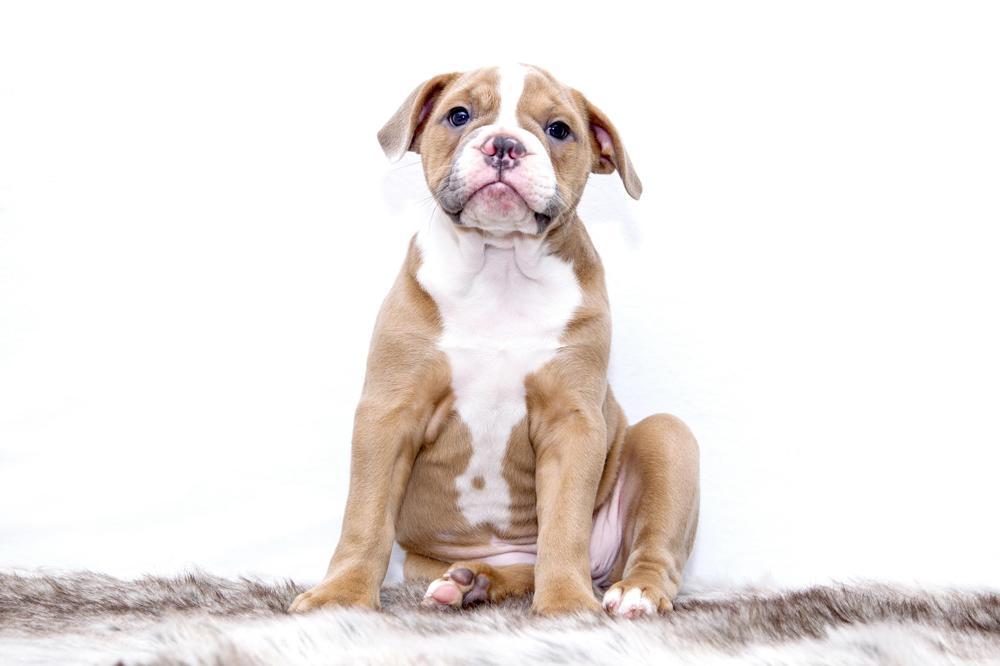
Bulldog Litter Size
Researchers from the Norwegian School of Veterinary Science did a study where they counted the numbers of puppies in 37 different Bulldog birth litters.
From this study, the researchers found that the average number of puppies that Bulldogs can have is 5 puppies. Also, the Bulldog can have as few as 1 puppies per litter and as many as 10 puppies per litter.
The number of puppies that the Bulldog will have depends on factors such as the age of the Bulldog, the method of pregnancy, etc.
Click here to see our calculator for predicting how many puppies your Bulldog will have and how the litter size of the Bulldog compares to the litter size of other dog breeds.
How Fast Bulldogs Can Run
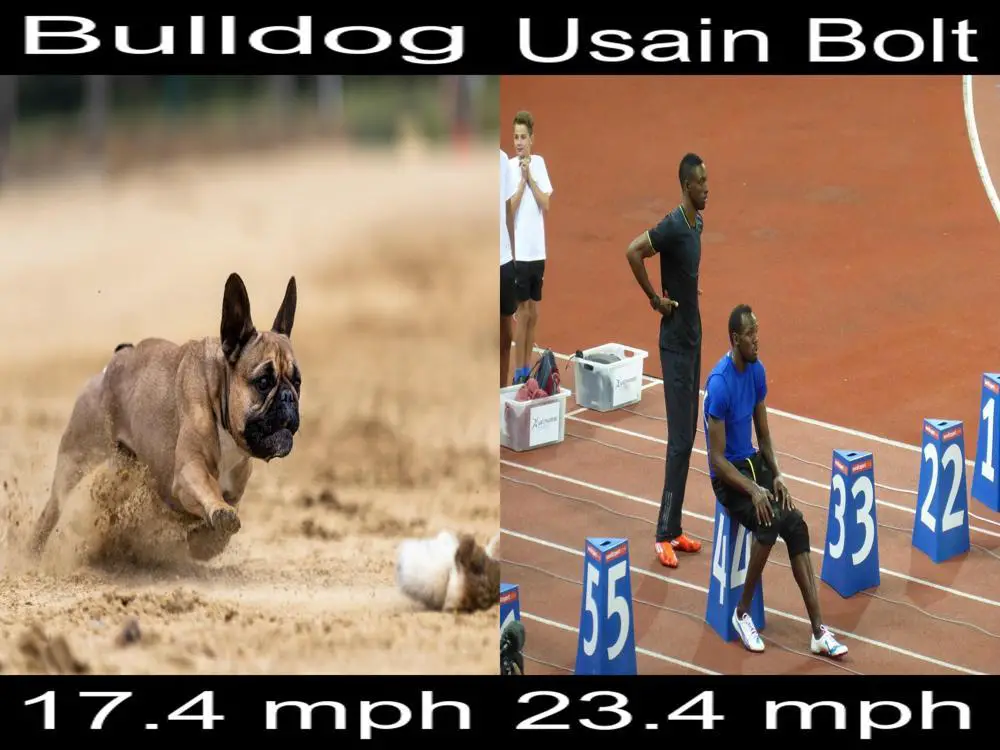
How fast a dog breed can run is a good measure of how athletic the dog breed is.
The American Kennel Club (AKC) regularly conducts dog running competitions. The AKC records the running speed of competing dogs in these competitions. These competitions are open to all dog breeds.
Based on our analysis of the speeds of 46 different Bulldogs, the average speed of the Bulldog is 17.4 mph (28.0 kmph).
The fastest speed on AKC record that the Bulldog ran in a race is 24.11 mph (38.8 kmph) and the minimum speed on record in a race for a Bulldog is 5.41 mph (8.7 kmph).
Click here to see how the speed of the Bulldog compares to the speed of other dogs and other mammals such as cats, horses, humans, etc.
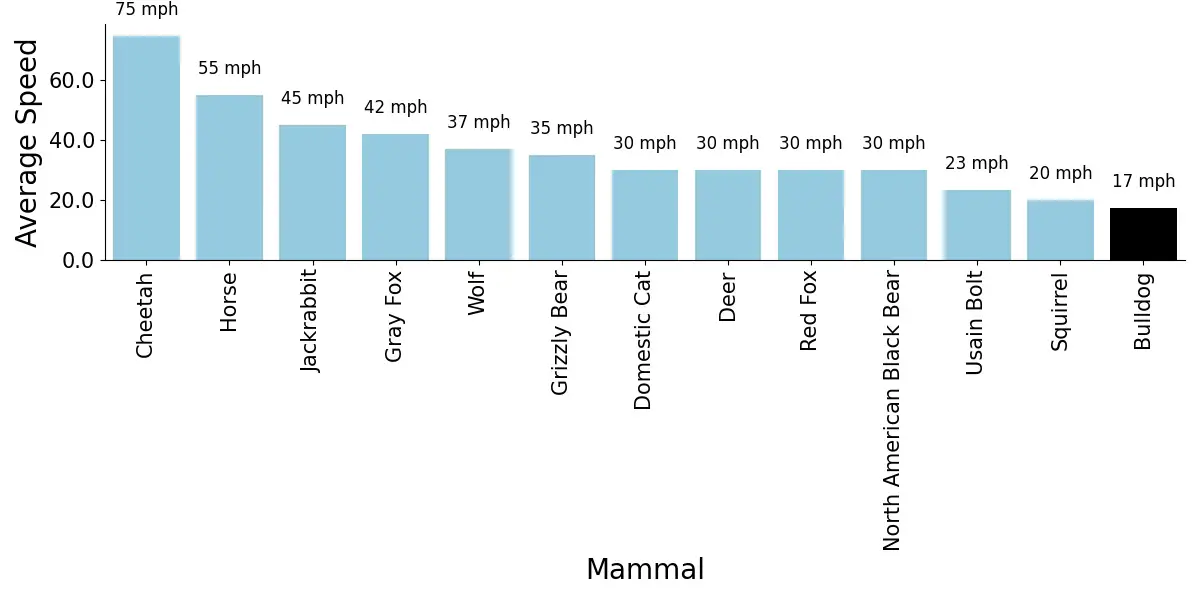
Good Names for Bulldogs
Here are some really good names that are typical for the Bulldog ranked by popularity:
- Rocky
- Tank
- Winston
- Shaggy
- Meatball
- Pig
- Brutus
- Max
- Hank
- Rocco

How Intelligent are Bulldogs?
| Bulldog | |
|---|---|
| Intelligence Rank | 77 out of 130 dog breeds |
| Trainability | Tend To Learn New Commands After 80 To 100 Repetitions Or More! |
According to Prof. Stanley Coren, a Canadian psychology professor/dog trainer, the total intelligence that a dog demonstrates is the addition of three types of intelligence. These intelligence types are:
- Instinctive Intelligence: This is the natural intelligence that comes from instinct. For example, dog breeds that have been historically bred to be guard dogs will have a high `guarding` intelligence compared to dogs that were not bred for guarding.
- Adaptive Intelligence (learning and problem-solving ability): This indicates what a dog can learn to do for himself or herself. Adaptive intelligence is specific to each dog, and not breed specific. You can improve your dog`s adaptive intelligence by investing time to train your dog.
- Working/Obedience Intelligence: This type of intelligence is breed-specific. Certain dog breeds tend to have higher working/obedience intelligence than some other breeds. This intelligence is the closest to what we might call school-learning ability and it is based upon what the dog can learn to do when instructed by humans. This type of intelligence can be measured for each dog breed and compared to that of other dog breeds.
Professor Stanley Coren measured and ranked the working intelligence of about 130 different dog breeds.
Prof. Coren found that the Bulldog has an obedience intelligence rank of 77 out of 130 dog breeds. Thus, Prof. Coren put Bulldogs in the `Lowest Degree of Working/Obedience Intelligence Dogs` category.
This means that Bulldogs tend to learn new commands after 80 to 100 repetitions or more!.
However, we should mention that a dog should not be judged based on its intelligence alone. There are other important factors you need to consider when deciding on which dog breed to get. These other factors include sociability, adorability, and compatibility of the dog breed with your lifestyle.
See the intelligence ranking of some other dog breeds below:
| Breed | Intelligence Rank |
|---|---|
| German Shepherd Dog | 3 |
| Shetland Sheepdog | 6 |
| Rottweiler | 9 |
| Belgian Malinois | 22 |
| Vizsla | 25 |
| Airedale Terrier | 29 |
| Welsh Springer Spaniel | 31 |
| Samoyed | 33 |
| Cairn Terrier | 35 |
| Finnish Spitz | 43 |
| Boxer | 48 |
| Rhodesian Ridgeback | 52 |
| Pug | 57 |
| Maltese | 59 |
| Dandie Dinmont Terrier | 62 |
| Chihuahua | 67 |
| Lhasa Apso | 68 |
| Bullmastiff | 69 |
| Shih Tzu | 70 |
| American Bulldog | 77 |

How Popular are Bulldogs with New Dog Owners?
Every year, the American Kennel Club (AKC) publishes information on how popular a dog breed is in that particular year. The AKC gets the popularity information of a breed from how many dogs of that breed the owners register with the AKC every year. The AKC collects this data for about 200 dog breeds.
The graph below shows the popularity trend of the Bulldog.
The popularity of the Bulldog averaged over the years is Number 4 out of about 200 dog breeds.
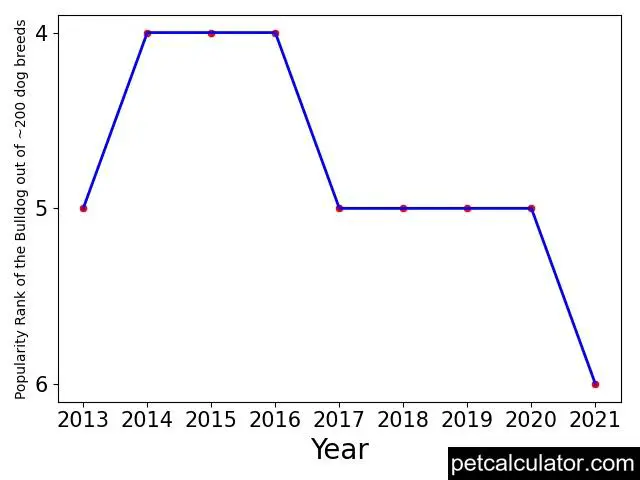
Do not get a dog breed just because it is a popular dog breed. And do not reject a dog breed just because it is an unpopular breed.
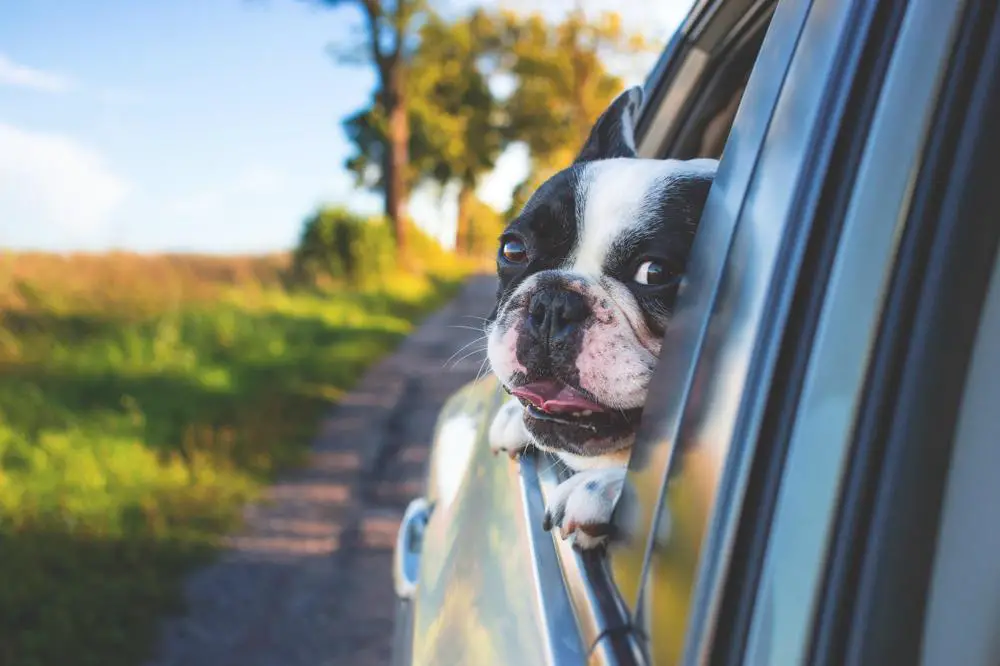
Health Problems in Bulldogs and How to Prevent Them
Every dog breed has its own set of health problems that it tends to develop. There is nothing like a perfect dog breed.
The Bulldog is prone to certain genetic health conditions. The Orthopedic Foundation for Animals (OFA) is an organization that keeps track of genetic health problems in dog breeds.
From the extensive records that the OFA keeps, the OFA knows what health problems each dog breed is naturally prone to develop.
Hence, the OFA recommends which health screening breeders should perform on a dog breed to make sure that the breeders won`t breed `defective` dog parents that can pass down defective genes to their puppy offspring.
If you want a Bulldog puppy that will grow up to be healthy, make sure that your Bulldog breeder screens your puppy or your puppy`s parents for the health problems that the OFA recommends for your puppy`s breed. This will increase the chances that your puppy is free from genetic defects.
The following are the health tests that Orthopedic Foundation for Animals (OFA) recommends that breeders should screen Bulldogs for:
- approved laboratory
- Autoimmune thyroiditis
- Cardiac Evaluation
- Congenital Deafness
- Elbow Dysplasia
- Eye Examination- after the age of 24 months
- Hip Dysplasia
- HYPERURICOSURIA
- Patellar Luxation
- Tracheal Hypoplasia
You can find out more about OFA`s recommended tests for Bulldogs here.

How to Take Care of Bulldog
To take good care of your Bulldog, you need to make sure that you groom your Bulldog regularly.
Secondly, you need to find a veterinarian in your area that will routinely check the health status of your Bulldog regularly, and give you appropriate recommendations on your Bulldog`s preventative care.
Thirdly, you need to commit some time to exercise your Bulldog daily. Regular exercise helps improve the health and quality of life of your Bulldog.
Also, you need to feed your Bulldog high-quality dog food, and the food should be of the right amount to prevent your Bulldog from getting overweight or underweight.
See our recommendations on what to feed the Bulldog and how much food to feed the Bulldog at different life stages.
Finally, you need to make sure that your Bulldog has access to clean water all the time. See our recommendations on how much water your Bulldog needs to drink at different ages.
Dog Breeds That Are Similar to Bulldogs
If you have not made up your mind on which dog breed to get, you may also want to consider some other dogs similar to the Bulldog.
We crunched the numbers and found that the following dog breeds that have similar behavior and temperament as the Bulldog:
- French Bulldog (68 percent match with Bulldog). Learn more about the French Bulldog here.
- Staffordshire Bull Terrier (68 percent match with Bulldog). Learn more about the Staffordshire Bull Terrier here.
- Valley Bulldog (75 percent match with Bulldog). Learn more about the Valley Bulldog here.

Other Things to Know About Bulldogs
Here are some of the very important characteristics of the Bulldog that you need to know about the Bulldog breed:


